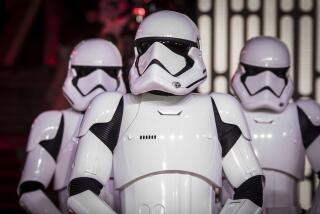From the Archives: ‘Star Trek VI: The Undiscovered Country’ is back on the right trek
- Share via
Last hurrahs don’t always take. And so you have to wonder about the current valedictory, in “Star Trek VI: The Undiscovered Country” (citywide), for the crew of the starship Enterprise.
Is this really the last flight for William Shatner’s stolid but often anguished Captain Kirk? For Leonard Nimoy’s ultimate Vulcan logician Spock? For bilious “Bones” McCoy, exasperated Scotty, sultry Uhura, watchful Chekov and prim Sulu--played, respectively, by DeForest Kelley, James Doohan, Nichelle Nichols, Walter Koenig and George Takei?
By the studio’s word, and the evidence of the credits, it is. The final entry in the Captain’s Log. The climax for a cast--one that has been together for a quarter of a century--of a 25-year voyage across TV and movie screens, through the vastness of “Space: The Final Frontier.”
Yet is it, really? There seem to be two conflicting impulses in “Trek VI”: a desire to wrap up the epic with panache, and another desire to get back on track after the misfire of “Star Trek V.”
The central creative team--writer-director Nicholas Meyer, co-writer Denny Martin Flinn and executive producer-story author Nimoy--have succeeded so well in reviving the “Star Trek” mythos that they make the valedictory seem premature. Why give up when they’re all cooking again? “Star Trek V,” with its overdose of self-kidding and kittenish camaraderie, may have seemed like a dead-end, but “Star Trek VI,” which is dedicated to the series’ late creator, Gene Roddenberry, opens it back up.
So swept up is the crew in the dark machinations of “VI’s” complex plot that they don’t have time to say goodby properly. With the apparent end of the eons-long battle between the Klingon Empire and the United Federation of Planets disrupted by Kirk and McCoy’s trial for murder--they’re too caught in the pell-mell rush of mysterious space attacks, assassinations and double-crosses. The Klingon Gen. Chang, played in another of his grandly hammy, self-amused turns by Christopher Plummer, may muse about “hearing the chimes at midnight,” but the Enterprise crew is too busy rescuing Kirk and McCoy--not to mention the entire universe--to bother with reminiscence or poetry.
There’s an urgency about “Star Trek VI” that comes from its deliberate topicality. Meyer and Flynn--and Nimoy--have returned “Trek” to its usual ‘60s TV strategy: making a thinly veiled allegory about current events--in this case, the Soviet Union breakup. They’ve loaded up “Trek VI” with contemporary parallels: including a Gorbachev figure, Chairman Gorkon (David Warner) and the economic paralysis of the Klingons (i.e. Russians) after years of military overspending.
The parallels don’t give the movie any profundity, but they do endow it with some dramatic weight. Meyer and Flynn lace the script with so many Shakespearean quotes, mostly from Chang, that it’s as if they were trying to jump-start “Trek VI’ into epic grandeur. But, as the movie unwinds on those cavernous sets, intergalactic gulags, snowy wastelands and those now lovably sterile starship holds, we do get a sense of twilight falling, plus some of the jittery uncertainty of a time of historical transition.
The TV “Star Trek” always suggested the universe in a bottle, or infinity on a sound stage, and this movie has some of the same full-bodied kitsch audacity. The spiney-skulled Klingons are nightmarish, and when one of them is killed on a weightless ship, blood-balloons burp out of his body and float in the air. The movie’s funniest joke may be a sly dig at Shatner--which he accepts good-naturedly. Confronted with a shape-changing alien turned into his own mirror-image, Kirk gasps, “And to think I kissed you!” and the doppleganger cackles, “Your lifelong ambition!”
There’s a backstage buzz that the best “Star Trek” movies have been the even-numbered ones: “Star Trek II,” with its wild melodrama and heart-crushing climax and “Star Trek IV,” with its ensemble humor and heart-on-sleeve humanism. Meyer was involved in both those movies--as director of the first and co-screenwriter of the second--and he seems back on stride here.
There are weaknesses here--especially when the climax becomes too packed and chaotic, and the goodby over-hasty. But Meyer and Flynn get a fullness back into the characters. Nimoy plays Spock as if he’s bowed under a tragic weight, as if the logic were about to crush him, while there’s something almost joyously reckless about Shatner’s Kirk. The hallmark of the ensemble was always an almost opaque restraint, under which we thought we could catch glimmers of emotion and now, the cast--older and, perhaps, saying their farewell--tend to burlesque their own restraint, open up the cracks.
Paradoxically, “Star Trek VI” (MPAA rated PG) works so well on its own terms that it looks less like a close than another possible opening. What if the retired Enterprise crew met a few years later and decided that the starfleet’s whippersnappers were messing up the peace, that it was time for one last mission on their own…
More to Read
Only good movies
Get the Indie Focus newsletter, Mark Olsen's weekly guide to the world of cinema.
You may occasionally receive promotional content from the Los Angeles Times.










